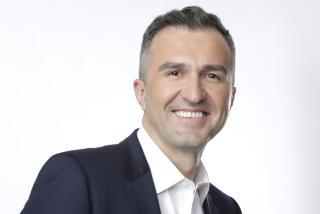Which Way to Network Success?
- Share via
Iwas flabbergasted by ABC Entertainment President Susan Lyne’s remark (quoted in Brian Lowry’s column Wednesday, “ABC Looks Back, Hoping It Will See the Future”) that ABC will leave “groundbreaking [prime-time programming] to someone else.”
Lyne undoubtedly merely echoes her superiors, but such a policy ought to set ABC founder Leonard Goldenson spinning in his grave.
Instead of recycling tired concepts and retired executives from the glory days when the network vanquished all comers in the ratings, ABC management might better reflect on how Goldenson built ABC into the top network of the 1970s and early ‘80s: by trying ideas never tried before, and by hiring people with fresh ideas and giving them the resources to produce, yes, groundbreaking shows.
One of Goldenson’s hottest hotshots was twentysomething Michael Eisner, a fountain of wild notions who refused to censor himself. Eisner wowed his boss, Marty Starger, with off-the-wall show notions like a ‘50s high school crowd. “Happy Days” was original, trend-setting, successful.
Say, isn’t ABC debuting a show about a ‘50s family this fall?
Young Eisner saw the synergistic possibilities in turning the Jackson Five--adolescent Michael and his brothers--into an animated kids show.
He had a lot of ideas, and if many led nowhere, quite a few became hits.
Goldenson delegated well. He gave junior executives like Eisner a lot of rope and stayed out of their way. But he also listened to everybody; his door was always open. CBS and NBC blew off a brash young documentary filmmaker named David L. Wolper, but Goldenson bought Wolper’s “The Making of the President.” From that relationship came “Roots,” an expensive, groundbreaking epic about black slavery, a prime-time miniseries for largely white audiences, aired on eight consecutive nights--a new approach and a colossal gamble. That was Goldenson--always ready to bet his gut.
Of course, he made mistakes. He turned down Norman Lear’s “All in the Family.” Twice. At ABC, only Eisner thought America was ready for such a pioneering concept.
But mostly Goldenson guessed right. And he backed his underlings: When Edgar Scherick, whose background was in sports production, wanted to leave sales to head programming, Goldenson gave him a shot. He ignored those who ridiculed the notion and let Scherick turn a comic book into an improbable series like none other: “Batman.” He listened again when Scherick opined that replacing low-rated shows in midseason was better than waiting months to debut new ones. Now every network has a second season.
If good television is always risky business, ABC--under the firm guidance of one Michael Eisner, chairman of parent Walt Disney Co.--now prefers safe and tried material. They pour old wine into new bottles and repackage tired concepts in the hopes that no one will notice.
A few years before he died in 1999, Goldenson told me that “Fox trumped our ace” when that network turned out new shows to capture young audiences and new kinds of shows aimed more broadly. But by then ABC belonged to Capital Cities.
And long before the multimillionaire CEOs of bankrupt behemoths became household names, Goldenson explained the risks of operating a company when its board is controlled by company management: “Good outside directors will always try to do what’s best for the company,” he said. “But management directors are always tempted to do what’s best for themselves.”
Television has evolved in many ways since the post-World War II era when Goldenson entered it, starting with big screens and color and progressing through cable to new networks and a fragmented audience. But some things don’t change. “In the end, it’s just pictures flickering on a screen,” said Goldenson. “If people like what they see, they’ll watch it.”
When I spoke with Eisner in 1990, he described his early years at ABC: “We were all in a fish tank, but there was nobody saying, ‘This fish, that fish.’ So the strongest fish dominated, the most creative. I think that’s how ABC succeeded.”
Michael, ABC can succeed again. Every hotshot cools. Jump out of the tank; get new fish who don’t know what’s impossible and let them fight it out. Take chances--and ask yourself how Leonard almost always got his way during the decades when most ABC directors were outsiders and the network was a winner.
Hey, there might even be a show there.
Marvin Wolf collaborated with Leonard Goldenson to write “Beating the Odds” (Scribners, 1991), an account of Goldenson’s years at ABC. His latest book is “Buddha’s Child, My Fight to Save Vietnam” (St. Martin’s, 2002), in collaboration with former South Vietnamese Prime Minister Nguyen Cao Ky. Wolf lives in Los Angeles.
More to Read
The biggest entertainment stories
Get our big stories about Hollywood, film, television, music, arts, culture and more right in your inbox as soon as they publish.
You may occasionally receive promotional content from the Los Angeles Times.










